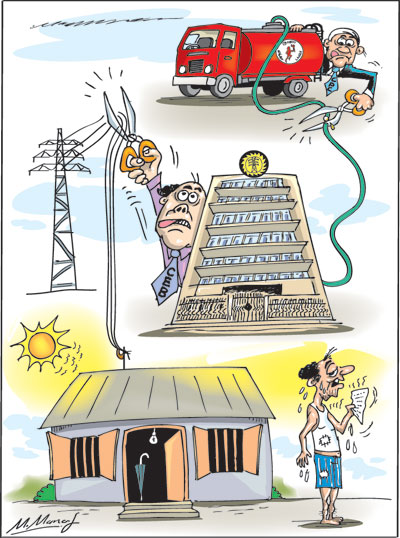News
Ministry committee faults CEB for arbitrary power disruption on February 3
 A six-member committee of the Ministry of Power and Energy (MoPE) has faulted the Ceylon Electricity Board (CEB) for the near seven-hour power cut it imposed on February 3 this year, saying it had been neither an emergency nor necessary.
A six-member committee of the Ministry of Power and Energy (MoPE) has faulted the Ceylon Electricity Board (CEB) for the near seven-hour power cut it imposed on February 3 this year, saying it had been neither an emergency nor necessary.
The committee reinforces a report earlier in the week by the regulator, the Public Utilities Commission of Sri Lanka (PUCSL), which drew the same conclusions. It said that the load shedding could have been avoided as the system had enough hydro capacity to meet full demand during the period.
Load-shedding is the suspension of electricity supply to avoid excessive load on a generating plant. The CEB claims the power cut from 10.45 a.m. to 5.02 p.m. was an emergency as it was discovered only on the morning of the interruption that the Yugadanavi oil-fired power plant was out of fuel and that the Ceylon Petroleum Corporation (CPC) would not supply it anymore.
Owned by LTL holdings and operated by West Coast Power (WCP), the power station has billions of rupees in unsettled invoices with the CPC.
The MoPE committee observed that the Assistant General Manager (Corporate Strategy) of CEB had neither informed nor obtained permission from PUCSL for load shedding. Had this been done well in advance and necessary planning undertaken based on a situational analysis, it said, the load shedding on February 3 could have been avoided.
There was total hydro storage availability of 884.5 GWh on February 2. The energy saved owing to the power interruption on that day was just 1.4 GWh.
The Mahaweli Authority’s Water Management Secretariat had made it clear that Kotmale, Victoria and Randenigala reservoirs were made available for power generation and there were no restrictions for the purpose of irrigation between January 1 and February 3, 2020.
But the CEB/System Control Centre reduced the generation in those hydro power plants at a time when the availability of thermal power plants was limited (Unit 1 of the Lakvijaya coal power plant in Norochcholai was also not functioning).
“Hence, even if the scenario is established as an emergency, the action taken by CEB/System Control cannot be accepted as technically correct,” the MoPE committee states.
The CEB was aware of the situation in advance and had “enough time” to inform the PUCSL and get its approval if load shedding was required, it continues. The CEB is mandated by law to get the regulator’s prior approval for a power supply interruption.
The utility says its ‘power crisis committee’ had granted authority for a scheduled load shedding. The MoPE inquiry concludes it had no authority to do so and that it was only the PUCSL that had such power.
Yugadanavi was previously out of commission on five occasions between November 2019 and January 2020 due to non-availability of fuel. Lakvijaya Unit 1 was also down for a planned maintenance on the same days.
“The situation was quite similar (two major plants were out of operation) to that of Feb 3, 2020,” the MoPE inquiry says. “But the system was in operation without a power interruption on those five days.”
An operations report submitted by CPC states that neither the CEB nor WCP gave any indication of power interruption on February 3 due to unavailability of fuel. “Had this been informed in advance to CPC, the committee believes that a solution could have been worked out amicably, and electricity supply interruption could have been avoided,” the Committee says.
The fuel HF4 is provided by CPC to WCP on credit. Consumption per day is 1,450 metric tons. The credit limit was initially Rs 8.5 billion. It was increased several times, and by February 3 the effective credit limit had been Rs 12.7bn (it was raised to Rs 13.2bn after the interruption).
The CPC Chairman told the MoPE inquiry that, had a request been made by CEB even to its Finance Manager, it would have accommodated fuel supply as on previous occasions. The CPC had not been given any indication that the CEB was going to impose a power interruption due to non-availability of fuel on February 3, 2020.

